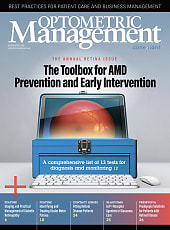Recognize whether a job isn’t the right fit
In a post-COVID-19 world (if we can officially say that yet!?), job satisfaction is arguably more important than ever. After all, we’ve been through a lot these last couple of years and if I’ve learned one thing, it’s how grateful I am to be excited to go to work every day. Now, I don’t expect everyone to be jumping out of bed with the same level of excitement as Buddy from Elf, but dreading the day ahead isn’t good either. I’ve observed new graduates do one of two things concerning their jobs: either cutting and running before giving an opportunity a chance, or staying way longer than they should have. Before optometrists make a change, they may want to consider the following:
IT’S NOT ABOUT TIME
There is no magical amount of time to stay at a job to know whether it’s a right fit. On the one hand, I’ve heard horror stories of gross misconduct occurring, but ODs staying because they didn’t want their resume to show they were employed at a location for only a few weeks.
On the other hand, just because the optometrist has been at a job for a year, that doesn’t mean they’ve put all the effort into maximizing their work environment.
Based on these scenarios, ODs should rely on their natural instincts, listen to their gut and move on when that little voice in their head says it’s time — the rest will fall into place.
R.E.S.P.E.C.T.
While my singing voice doesn’t do Aretha Franklin justice, I’ve been reciting “Respect” in my head the entire time I’ve been writing this article.
Respect must be given as well as received to foster a positive work environment. ODs who experience burnout and/or report low job satisfaction can feel undervalued and disrespected by their supervisor and/or colleagues. In this case, making a move is likely in this optometrist’s best interest.
PHONE A FRIEND
If the OD is out of lifelines, and it feels like the host has started the count down for them to decide, discussing options with a seasoned colleague can be very helpful. This person is someone who has been around the block and, can, therefore, provide valuable insight.
Note: It’s important to make the conversation as constructive as possible, vs. a complaint session. The latter may get the empathy of the colleague, but not the guidance the optometrist is seeking. My advice? Provide the full picture of what’s making the work environment less than satisfying and add context.
For example, “I feel like there is no work-life balance where I work. I’ve been at the practice for 3 months, and at least 3 times a week I am expected to stay late. It seems to be part of the culture there. This wasn’t explained to me before I started, and I feel like those constant late nights are affecting time with my family. What would you do if you were in my shoes?”
SHOULD I STAY, OR SHOULD I GO?
In “6 Signs It’s Time to Leave Your Job,” written by John Coleman for the Harvard Business Review, he points to lack of growth, job avoidance, and a toxic culture, among other factors (see sidebar), that signal it’s time to move on. (See bit.ly/HBRJob .) It may make sense to create a pros and cons list of staying, as well as weighing the risks of leaving. There is no reward without risk, but “the grass isn’t always greener on the other side.” OM
TIME TO PUT IN NOTICE
1 The Job is no longer encouraging your growth.
2 You’ve acheived your goal(s).
3 You’re constantly looking for ways to avoid your job.
4 You always approach work with exhaustion, burnout, or dread.
5 The job is causing you to develop bad habits.
6 The work place itself has become unhealthy.





